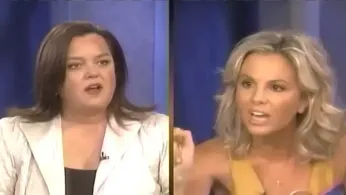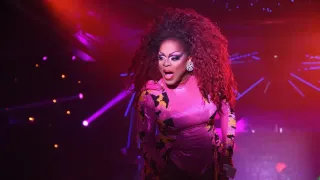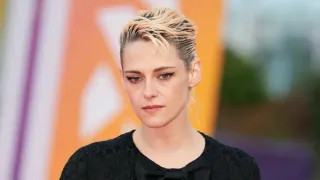
4 hours ago
Rosie O’Donnell Suggests Infamous On-Air Clash With Elisabeth Hasselbeck on ‘The View’ Was “A Set-Up”
READ TIME: 3 MIN.
Rosie O’Donnell, the comedian, actor, and longtime LGBTQ+ advocate, has revisited one of daytime television’s most memorable moments, alleging that her heated on-air dispute with co-host Elisabeth Hasselbeck in 2007 was likely “a set-up” by producers of ‘The View’ . O’Donnell’s comments were made during a recent episode of the podcast “Now What? with Brooke Shields,” where she reflected on her time on the panel and the infamous incident that ultimately led to her departure from the show .
The May 23, 2007, episode of ‘The View’ became a landmark moment in live television history when O’Donnell and Hasselbeck engaged in a fiery exchange over the Iraq War. The segment quickly devolved into personal attacks, with both co-hosts raising their voices and interrupting each other. The confrontation received widespread media coverage and has since been cited as one of the most contentious moments in daytime TV .
O’Donnell, who had joined ‘The View’ in 2006, was a prominent progressive voice on the panel, while Hasselbeck represented a conservative perspective. Their ideological differences were a frequent source of tension, but the May 2007 argument marked a tipping point. O’Donnell exited the program shortly thereafter, citing the fallout from the incident as a primary factor .
In her recent podcast appearance, O’Donnell revisited her final days on ‘The View’ and expressed her belief that the explosive argument with Hasselbeck may have been engineered by producers seeking ratings or controversy. “Looking back, I think it was a set-up,” O’Donnell stated, suggesting that she was not given adequate support or warning before the segment aired live .
O’Donnell described feeling isolated in the aftermath of the confrontation and noted that the incident had a lasting impact on her career and public image. She also expressed concern about how LGBTQ+ personalities are often positioned in mainstream media environments, stating, “It’s not uncommon for producers to foster conflict for the sake of ratings, but it can be especially damaging for people who are already marginalized” .
O’Donnell’s remarks have reignited debate among media professionals and viewers regarding the ethical responsibilities of television producers. Several former ‘The View’ staffers and media analysts have weighed in, with some noting that the program has a history of encouraging passionate debate but denying any intentional orchestration of personal conflict . Others have pointed to the broader trend in reality and talk show programming of leveraging interpersonal drama to drive ratings.
Barbara Walters, the show’s creator and longtime moderator, has previously addressed the 2007 incident in her memoir, attributing it to the “genuine differences” between the co-hosts rather than producer interference . However, O’Donnell’s claims have prompted renewed scrutiny of how talk shows balance authentic conversation with entertainment value.
Rosie O’Donnell, as one of the most visible lesbian celebrities in American television history, has long advocated for fair and respectful representation of LGBTQ+ voices in media. Her allegations about the circumstances surrounding her departure from ‘The View’ have prompted members of the LGBTQ+ community and allies to reflect on broader issues of inclusion and respect in the industry.
Industry advocates have called for greater transparency from producers and networks regarding the conditions under which talk show content is created, as well as more robust support systems for LGBTQ+ talent. As O’Donnell’s story continues to make headlines, many hope it will spark meaningful dialogue about the ethical treatment of LGBTQ+ individuals in the media and the importance of authentic representation .
While some former ‘The View’ staff and media commentators dispute O’Donnell’s claim of a deliberate set-up, her remarks have nonetheless shone a light on the complex intersection of entertainment, ethics, and identity in the television industry. As audiences and advocates call for greater accountability, the incident serves as a reminder of the ongoing challenges faced by LGBTQ+ personalities in high-profile media roles .
The conversation sparked by O’Donnell’s allegations has the potential to promote industry-wide reflection and reform, ensuring that all voices—especially those from marginalized communities—are treated with dignity, respect, and fairness on and off the screen.






